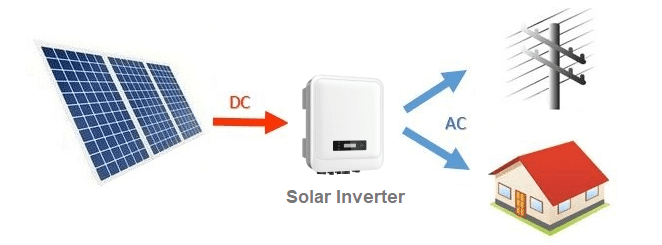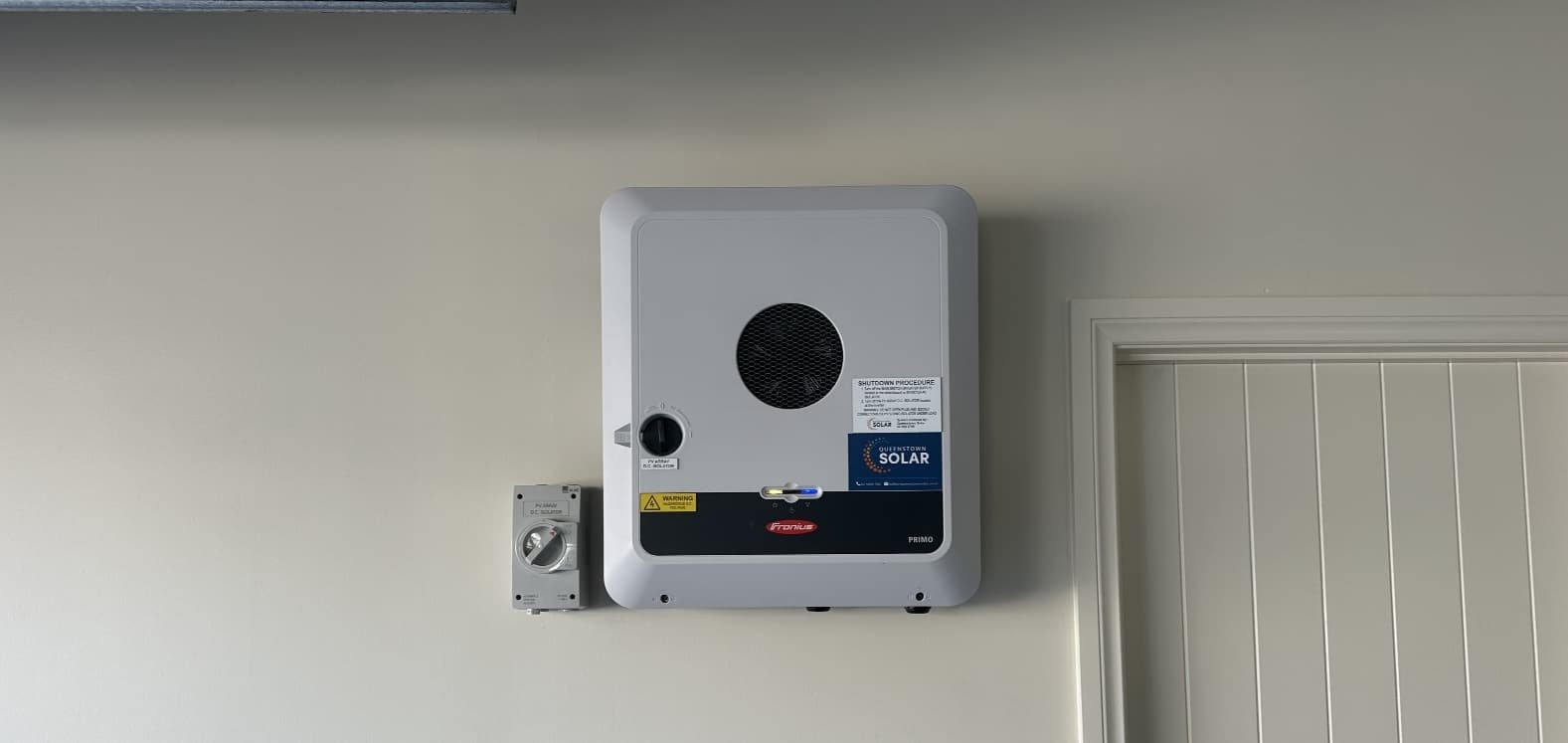Why Fronius offers the best solar inverter for NZ in 2024
The best solar inverters for NZ homes
As you’ve learned more about solar, you’ve likely discovered that while solar panels get all the glory, one of the most important components of your system is the solar inverter.
Responsible for making the sun’s energy usable in your home as well as the performance and safety of your system, it’s a piece of kit worth getting right. But when faced with a multitude of options, how do you know which inverter is best?
In this guide, we’ll break down what an inverter is, the important role it plays in your system and tell you why we think Fronius offers the best inverters for New Zealand conditions.
What is a solar inverter?

Often referred to as the heart and brains of a system, the solar inverter is responsible for converting DC (direct current) energy produced by the photovoltaic cells in your panels, into AC (alternating current) that can be used by the appliances in your home.
Why the inverter is so important
A good solar inverter’s job doesn’t stop there. About the size of a medicine cabinet and hung on a wall (indoors or outside), this hard-working unit is also responsible for:
- Optimising the performance of individual panels to ensure maximum energy production across the whole system.
- Giving you information about your energy production so you can be smart about when to use power.
- Ensuring the system is safe by preventing overheating and monitoring the grid connection.
- Providing backup power functionality to your battery, if you have one.
How well, and for how long, it does each of these important jobs depends on the quality of the inverter. As the hardest working component, with the most moving parts, it’s also the piece most likely to fail. To avoid this, our advice is to buy the best quality inverter you can afford.
Dive into more detail around what to look for in a good solar inverter here. Or read on to find out which is the best inverter for NZ conditions.
The best solar inverter available in New Zealand
In our opinion, Austrian-based company Fronius, offers the best solar inverters on the market right now, hands down.
While they aren’t the cheapest option, they do offer the best value. Here’s why.
A quality product built to last

The longer your solar system lasts, the more free power you’ll enjoy. How long your system lasts comes down to the quality of each component. As the hardest working component in the whole system, inverters are the most likely piece of the puzzle to fail.
Therefore, to get the most from a system that will be on your roof for 30+ years, it’s smart to spend money on the best quality inverter you can afford.
Fronius inverters boast one of the lowest failure rates on the market at less than 0.5%. Plus their quality claims are backed up with years of experience and rigorous product testing.
Bonus point: In all our years of installing solar, we’ve never had a Fronius inverter fail.
Market-leading warranty with fast, NZ-based support
When you register your inverter in the Fronius Solar.Web app (you’ll want this monitoring software anyway, we’ll even set it up for you) you get a 10-year warranty period. They even offer the option to extend this warranty to 20 years – one of the longest warranties available.
While other players might offer an equivalent 10 year standard warranty period, you want to be sure you’re purchasing from a company that will fix problems quickly with little hassle. After all, every day your system is offline you’re missing out on free power.
With NZ-based support and fast turnaround times on replacements and repairs, Fronius’ superior service means you can be sure your system will be back up and running as quickly as possible. On the other hand, we’ve dealt with other suppliers, such as Sungrow, that have taken up to a year to correct an issue covered under their warranty.
Bonus point: As one of the world’s biggest manufacturers having been in business for the last 75 years, it’s safe to say that as a company, Fronius will also be around to honour their warranty too.
Flexible upgrades
We install both residential and commercial Fronius inverters, which you can read more about here. The Fronius GEN24 and GEN24 Plus are the newest models on the market and are the ones we typically specify for residential systems on a single or three phase supply.
The main difference between the two is that the GEN24 Plus includes the software to make it battery ready.. Which, you guessed it, you’ll need if you plan on having batteries. This is what we call a Hybrid Inverter. But the beauty of Fronius’ kit is that the software of the standard GEN24 model can be upgraded later if you choose to add a battery down the track.
Bonus point: With a cheaper price point than the Hybrid, starting with the standard GEN24 unit can be a useful option if you are trying to spread the costs.
Active cooling for safety and longevity
One of the main contributors to the longevity of Fronius inverters is their use of Active Cooling.
Overheating is a common cause of parts failure so having active fan cooling on top of the standard passive heat sink ensures components stay cool and last much longer. Using a fan to circulate air inside the inverter also avoids the risk of hot spots.
Bonus point: High ambient temperatures negatively impact the yield of your solar system so a good cooling system means better returns too.
Market-leading shade management

All Fronius inverters have a good quality MPPT (Maximum power point tracker) integrated into the inverter to mitigate the effects of shading on your production.
This intelligent tracker recognises when one panel, or an area of a panel, is being shaded by something like a passing cloud or a fallen leaf. Even the orientation of the sun in relation to the direction your panels are facing. It is then able to isolate the shaded area and automatically mitigate the negative impact this has on the system’s total production. By contrast, a cheaper inverter with a basic tracker can’t cope with shade that well and you’ll likely see the production of every panel drop to meet the output of the single shaded one.
In Fronius inverters this technology is called Fronius Dynamic Peak Manager and on a sunny day, can increase yields by 7% compared to systems without shade management.
Bonus point: Having this technology integrated in the inverter from the beginning, rather than as an add-on later, is known to increase system reliability while decreasing the risk of fire and failure of parts.
Monitoring for maximum returns
Adjusting your usage habits to consume power when the sun is shining is the fastest way to generate returns. Visibility of your usage and production is key to this.
Fronius Solar.Web is Fronius’ monitoring dashboard. It’s really easy to use and can help you align your power use with
production, identify hidden power guzzlers and find small lifestyle switches that will save you money. Take a look at how it works with our Solar.Web demo here.
Bonus point: Fronius inverters have in-built controls that allow you to automatically maximise your solar usage. You can also integrate with products to divert excess solar to hot water heating (Fronius Ohm Pilot) or EV charging (Fronius WattPilot).
Sustainably made
We all know that the most sustainable product is the one you don’t have to replace and Fronius’ commitment to this ethos is clear. We’ve already talked about their use of quality components built to last and active cooling to prevent parts failure.
But when it comes to sustainability, they haven’t stopped there. Fronius inverters are designed with repairability in mind. So if something goes wrong, we can usually replace a part rather than the whole inverter. A better use of resources, while saving time, money and getting your solar is back producing free power again, faster.
Bonus point: Fronius inverters are made from 80% recycled materials and the cooling elements in GEN24 inverters are made from 100% recycled aluminium. Naturally, their factory is 100% powered by renewables too.
The best solar inverters in 2024
In the table below, we’ve compared some of the most common inverters available in New Zealand right now. While we’ll almost always recommend Fronius, there are specific circumstances where we’ll specify another brand, such as Victron for off-grid projects.
Fronius |
SMA |
Goodwe |
Sungrow |
|
Logo |
 |
 |
 |
|
Price |
$$$ | $$$ | $ | $$ |
Quality |
Top quality | Good quality | Budget quality | Mid-range quality |
Company founded |
1945 | 1981 | 2010 | 1997 |
Place of manufacture |
Austria | Germany/
China |
China | China |
Warranty |
5 + 5
extended 20 year warranty available |
5 + 5 | 10 year warranty but this doesn’t allow battery modules to be added post-install | 5 years with the option to extend to 10 years |
Support |
NZ-based support and fast delivery on replacement parts | Australian-based support | Australian-based support | Australian-based support |
Monitoring software |
Fronius Solar.Web
Easy to use with lots of features |
SMA Sunny Portal | GoodWe SEMS
Fairly basic |
Sungrow iSolarCloud
Basic |
Cooling type (passive/fan) |
Passive + Fan | Passive | Passive | Passive |
Appearance |
All cabling can be hidden | Cabling exposed | Cabling exposed | Cabling exposed |
Sustainability highlights |
|
|
|
|